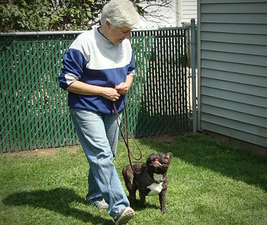When people describe their dogs, almost all will include the word “stubborn” in their dog’s story. We hear it all the time. But when we ask for an example, most people will tell us a story where the dog is either uncertain, or unmotivated. Your dog’s not stubborn. It’s really not a dog thing.
If your dog isn’t doing what you want them to do when you want them to do it, that’s not stubborn. Your dog is telling you either they don’t understand what you want, or you haven’t given them a good reason to do it.
The most rewarding thing
Dogs always do the thing that’s most rewarding to them. The tricky part for people is figuring out what that is. Because you don’t get to decide how valuable anything is to your dog. Just like people, dogs have their own opinions, tastes, and preferences.
Two of our dogs scour the yard searching for rabbit poop to consume. We hate that. It’s completely disgusting. But to get them to stop, we have to offer something better. Fortunately, Chicken Heart Treats are better than bunny pellets. So when we know there’s a rabbit spending time in our yard, our treat pouches are full of high-value treats. There are times when our usual Cheerios and Kibble mix won’t do.
That’s an instance where the fix is pretty easy. Could we have said our dogs were being “stubborn” about not coming inside? Or “stubbornly” doing something we’ve told them not to? Sure. But they’re not actually being stubborn. They’re being dogs.
Just don’t get it
The other situation we hear about is when the dog either “ignores” a command, or disengages and walks away. Most people describe these as being stubborn.
But it’s not. Both of those are clear indicators that your dog doesn’t understand what it’s supposed to do. And it happens to everybody. You think your dog knows something, but they’re either not sure, or the situation is different.
We see this most often in our beginner classes. People think their dogs know something, like “Sit!”, and yet when they’re asked to do it, they don’t.
One of the quirks in the way dogs think is that they don’t generalize. That means they can’t easily transition learning to different circumstances. People are wired to generalize. For example – when a person learns how to use a fork, they can use any fork. No matter what it looks like, what it’s made of, or where they are. Dogs can’t naturally do that. If you teach your dog to “Sit!” in the kitchen, with a treat in your hand, standing in front of the dog, that’s how your dog knows sit. To have your dog broaden their understanding of “Sit!” you have to teach it in other places, standing beside the dog, without a treat, etc. Dogs can be taught to generalize, but it’s not part of their default settings.
Dogs are not stubborn
Putting a label like “stubborn” on your dog colors how you treat them. And what you expect from them.
Try looking at the situation from your dog’s perspective and see how it changes things. If your dog is doing something they find incredibly fun, what can you do to make your choice more attractive? If your dog isn’t doing something you ask, take a couple of minutes and a handful of treats to reinforce the behavior you want.
Enjoyed this post? Click here to sign up for the weekly newsletter and never miss another!










